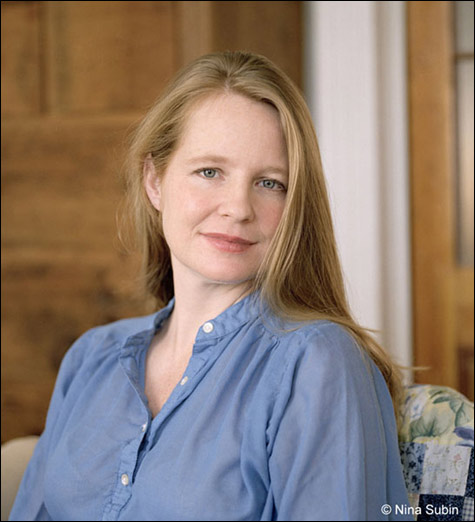Samantha Hunt weaves historical fiction from Nikola Tesla's biography
By CHRISTOPHER GRAY | March 11, 2009

A PARTIAL INVENTOR Historical-fiction writer Samantha Hunt. |
A solemn pigeon, a rolling thunderstorm, flecks of dust, a statue of Johann Wolfgang von Goethe in Manhattan's Bryant Park: nearly everything | SAMANTHA HUNT reads from The Invention of Everything Else | Mariner Books | 257 pages | $13.95 | March 16 @ 4:15 pm | at Chase Hall, Bates College, Lewiston | 207.786.6330 | March 17 @ 7 pm | at Portsmouth Public Library, 175 Parrott Ave, Portsmouth NH | 603.431.2100 | Free |
speaks in The Invention of Everything Else, Samantha Hunt's second novel. Most of the time, the world's sounding board is the aging eccentric Nikola Tesla, real-life inventor of alternating-current electricity, radio waves, and a death ray he believed could end all war in the world. In what may as well be a commentary on his disgraced state — Tesla believed energy should be free for all, and fame- and money-hungry patent-seekers reaped the benefits of his ideas and altruism — he's residing in 1943 at the New Yorker Hotel, the Manhattan hotel so large it held its own, direct-current, power plant. (The hotel switched to AC power in the 1960s, long after Tesla's death.) SAMANTHA HUNT reads from The Invention of Everything Else | Mariner Books | 257 pages | $13.95 | March 16 @ 4:15 pm | at Chase Hall, Bates College, Lewiston | 207.786.6330 | March 17 @ 7 pm | at Portsmouth Public Library, 175 Parrott Ave, Portsmouth NH | 603.431.2100 | Free
Tesla is essentially alone — he speaks to a pigeon he refers to as his wife, and he's reciting his memoirs to Samuel Clemens (Mark Twain), who by this time has been dead for over two decades — until a plucky 24-year-old chambermaid named Louisa becomes intrigued by the strange old man on the 33rd floor after she learns he's responsible for a complete blackout in the hotel. The two bond over unlikely similarities — Louisa also cares for pigeons, and is awestruck by radio technology — and spur each other's imaginations, despite the fact that they've become wary of idealism.
Their relationship is somewhat crudely synergistic, as all of Louisa's companions have dreams as unlikely as Tesla's. Louisa's father, still mourning a wife who died in childbirth, endeavors to try a time-traveling machine his long-lost friend Azor is building; and her new suitor, Arthur (who is possibly from the future), is an engineering whiz helping to construct the device. Tesla's history of disappointment anchors Louisa's skepticism about their scheme, but at the same time, his wondrous achievements give her pause.
Despite being overstuffed with tangential subplots, too-convenient characters, and predictable plot mechanics, The Invention of Everything Else brims with Tesla's prescient ideas about energy. Hunt's novel is thoroughly researched and endearingly enamored with its subjects. Even things that sound like literary license, like Tesla's friendship with a white pigeon, turn out to be true; only Louisa's half of the story — perhaps the titular "everything else" — is an invention. The Hotel New Yorker reads like a character unto itself, and in addition to Twain, there are cameos by George Westinghouse, Thomas Edison, and Orson Welles's War of the Worlds radio broadcast, among other fleeting guests. (Quotes Hunt borrows from historical documents are cited in the back of the book.)
 Related
Related:
Birds of paradise, What congress did on its summer vacation, NAScar-bon neutral?, More 
- Birds of paradise
A conversation with Jerry Laurutano, proprietor of Jerry’s Underground Hair Salon.
- What congress did on its summer vacation
Big fat whale
- NAScar-bon neutral?
Anyone trying to get their minds around the complicated puzzles of greenhouse gases and global warming can learn a thing or two by watching how motor sports are adapting to the growing pressure to become eco-friendly.
- Dance, Monkey: Kelly MacFarland
"Robots are hot and are incredibly strong."
- Dance, Monkey: Jim McCue
Who is the only governor who can diaper her children in moose pelts?
- Over the coals
Not so fast, Mike!
- Faltering steps forward
As in many other sectors, the green world in 2009 was marked as much by bluster as by tangible positive action.
- Video vérité
Javier Téllez's 2007 black-and-white film "Letter on the Blind, For the Use of Those Who See" starts with a catchy premise: he gathered six blind New Yorkers at an empty public pool in Brooklyn to act out the fable of the blind men and the elephant.
- Red Sparowes
The brainchild of Isis guitarists Jeff Caxide and Bryant Clifford Meyer, this post-rock outfit is inspired by Mao Zedong’s attempted eradication of farm-pestering sparrows in the late 1950s.
- Rant: We need more artists!
There's just not enough art to festoon all the walls in all the coffee/sandwich/burrito/gelato/bagel/pizza/frogurt shops in this great art-loving, snack-loving city of ours.
- 30 ways to have fossil-free fun in Boston this Summer
It’s tough to maximize your summer fun when, every time you start your engine, you realize that you’re strangling the last few breaths of life out of the planet’s 17 (or so) remaining white rhinos.
- Less

 Topics
Topics:
Books
, Media, Nature and the Environment, Wildlife, More  , Media, Nature and the Environment, Wildlife, Books, Radio, Book Reviews, Orson Welles, Birds, Chris Gray, Mark Twain, Less
, Media, Nature and the Environment, Wildlife, Books, Radio, Book Reviews, Orson Welles, Birds, Chris Gray, Mark Twain, Less 